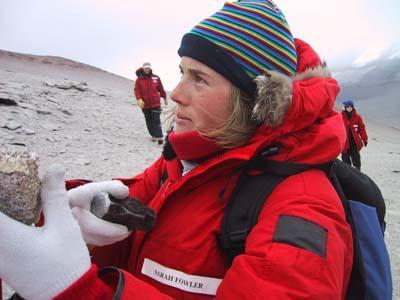24 January, 2003
Sarah Fowler has written this entry.
Nearly 30 years ago, my father parcticipated in a geological/ geophysical
study of the Antarctic Dry Valleys region. His reminiscences of the
interesting landscape have inspired me to follow.
I have come here with a notion gleaned from my academic advisor, Bruce
Marsh, that igneous rocks exposed in the Dry Valleys might offer a glimpse
of how magmatic systems-the guts of volcanoes-develop. Because of the harsh
environment, there are few living organisms in the Dry Valleys. The rocky
surfaces are constantly polished by wind, and delicate features that are
often obscured elsewhere in the world by vegetation or construction are
visible.
My parcticular interest here is in the processes that take place as hot
basaltic magma travels through the crust towards the surface. In the Dry
Valleys, dark-coloured basaltic magma was injected into pre-existing
light-coloured granitic rocks. Erosion has exposed the layers of basaltic
and granitic rocks in the valley walls. There is evidence that the hot
basaltic magma partially melted some granitic rocks and incorporated the
resulting liquids. I am collecting samples of basaltic rocks that contain
partially melted pieces of granite to examine the compositional and textural
changes that took place in the basaltic magma.

1. Sarah Fowler
Contact the TEA in the field at
.
If you cannot connect through your browser, copy the
TEA's e-mail address in the "To:" line of
your favorite e-mail package.
|
